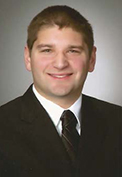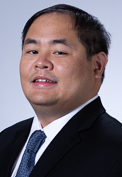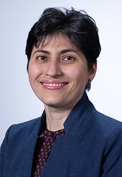Fellows |
2023–2025 |
|---|---|
|
|
Robert Lloyd, DO Dr. Lloyd attended medical school at Pacific Northwest University and trained in pediatrics at Phoenix Children’s Hospital. His research during residency included the development of a dashboard to monitor pediatric patients with inflammatory bowel disease, which led him to pursue a career in clinical informatics. After working with multiple electronic health records in residency, Dr. Lloyd took an interest in optimizing provider workflows with clinical decision support tools. With his training in clinical informatics, Dr. Lloyd aspires to streamline healthcare delivery through improvements in interoperability and precision medicine. In particular, he is interested in the use of blockchain technology in healthcare and wearable technology. |
|
|
Ankit Modi, MD Dr. Modi graduated from the Boston University School of Medicine and completed his pediatric residency at the Children’s Hospital Los Angeles. He was drawn to clinical informatics while working as an Epic SuperUser during residency. He also developed workflows to help residents navigate the EHR and clinical applications to help support their clinical work. Before residency, he worked as a healthcare consultant at McKinsey & Company, working with payers and providers to develop strategies for revenue growth and cost containment. His interests in informatics include developing clinical decision-support tools and exploring the balance of data liberalization to drive outcomes while ensuring patient privacy. Outside of work, you can typically find him running around with his dog Luna, playing golf, and traveling the world. |
Fellows |
2022–2024 |
|
|
Ajay Perumbeti, MD Dr. Perumbeti completed his pediatric residency at SUNY Upstate Syracuse, a pediatric hematology oncology fellowship at Cincinnati Children’s Hospital Medical Center and continued there as a research instructor and attending hematology working on gene therapy for sickle cell disease. With an interest in cellular therapy and lab medicine, he completed a transfusion medicine fellowship at Hoxworth Blood Center/University of Cincinnati. He became director of Transfusion Medicine at Children’s Hospital Los Angeles for six years, where he was drawn to technology in medicine and computer programming. After three years as medical director of Lab Informatics at Phoenix Children’s Hospital, he was accepted as a clinical informatics fellow at at the college. Dr. Perumbeti is energized by the transformative impact computing power, networks, cloud, edge computing, blockchain, bioinformatics and artificial intelligence will have on improving medicine, health and wellbeing. |
|
|
Daniel H. Lee, MD Dr. Lee graduated medical school from Loma Linda University School of Medicine and completed his internal medicine residency at Mayo Clinic Arizona. He is drawn to clinical informatics to explore simulated learning/assessments, as well as to understand and optimize the tools utilized to deliver health care. Throughout the fellowship, he will practice clinically as a hospitalist and work closely with interdisciplinary teams engaged in all health systems in the valley, namely Banner Health, the VA medical center and AHCCCS. He enjoys living in Arizona with his wife and two small dogs. Though seasoned as a sous-chef for his wife, he is exploring more aspects of cooking. |
Graduates |
2021–2023 |
|
|
Priyanka Costa Hennis, MD Dr. Costa Hennis is a board-certified family medicine physician who completed her residency training at Southern Illinois University – Quincy, where she served as chief resident in her final year of training. Her interest in clinical informatics started when she was in residency training — specifically, improving the efficiency of clinical workflows, decreasing clinician burnout and using data to paint a good business case drew her to this field. After her residency, she worked for five years as a hospitalist in rural and community-based hospitals in North Carolina and Ohio. She also completed her master’s in clinical informatics at Oregon Health & Science University while working full-time and having a family during that time. Her passion for streamlining workflows eventually led her to return to clinical informatics in a formal setting to execute projects for health care workers. |
 |
Kathryn Demitruk, MD Dr. Demitruk is a board-certified family medicine physician who trained at Southern Illinois University. She was drawn to a career in clinical informatics, so she can leverage technology to improve patient and provider experiences within every aspect of the health care system. Her goal is to improve delivery of care, optimize the EHR to improve workflow for health care providers, reduce physician burnout and minimize waste. She also has an interest in how the combination of predictive analytics, interoperability and machine learning can improve patient care. Like other esteemed colleagues that have completed the fellowship program, Dr. Demitruk intends to pursue these passions and become a leader within the field working as an informatician and hospitalist following her fellowship. |
|
|
2015–2017 |
|
|
J. Edward Maddela, MD Jed trained in family medicine at HonorHealth in Arizona. Subsequently, he served as a board-certified primary care physician for a local federally qualified health center, while also teaching at the University of Arizona College of Medicine – Phoenix. He is drawn to clinical informatics because of the interprofessional nature of the fast growing subspecialty. During this 2-year fellowship, he will focus on leveraging information and technology to optimize data-driven health care practices for the delivery of value based care. |
|
|
Umar Iqbal, MD Dr. Umar Iqbal’s interest in informatics stems from a desire to understand how to better implement IT solutions to improve health care. While completing his bachelor’s degree in Computer Information Systems (CIS) at ASU, Dr. Iqbal recognized that Clinical Informatics was becoming an emerging, new and unique field. With that in mind, he was involved in the implementation of an enterprise EHR within all ambulatory clinics at St Joseph’s Hospital. Later, during his residency training, he would use that knowledge to better serve in his role as Co-Chair on the Housestaff Leadership Council and on St. Joseph’s Medical Executive Committee by establishing new and effective quality improvement projects. This fellowship will allow Dr. Iqbal to continue refining the capabilities of informatics, while also collaborating with all of the major health systems in the valley. |
|
|
2016–2018 |
|
|
Christopher Hollweg, MD Dr. Hollweg trained in pediatrics at Richmond University Medical Center in New York City. While there, he created tools to reduce errors in medication and TPN ordering in the NICU. As chief resident, he implemented a mobile scheduling system for his residents. His interest in clinical informatics lies in its potential to make great strides in the advancement of medical care, by aggregating the wealth of data available and bringing it to bedside clinical practice. During the fellowship, Christopher intends to develop clinical decision support that is powerful and interoperable. |
|
|
Andrew Muth, MD Dr. Muth trained in pediatrics at Phoenix Children’s Hospital/Maricopa Medical Center. During his training, he discovered the field of Clinical Informatics through his involvement in the implementation of an ambulatory EHR solution. Throughout this fellowship, he will work closely with interdisciplinary teams engaged in all health systems in the valley, as well as practice clinically as a general pediatrician. He is focused on optimizing health care delivery and becoming a leader in the field. Some of his interests include: interoperability, patient safety, big data analytics and population health management. |
|
|
2017–2019 |
|
|
Behnam Vahdati Nia, DO Dr. Vahdati Nia is a Diplomate of the American Board of Family Medicine and trained in Family Practice at Marian Regional Medical Center in Santa Maria, California. During his residency, he assisted with implementation and optimization of Electronic Health Records (EHR), as he worked closely with the faculty, staff and the clinical informatics team. As a Clinical Informatics Fellow, he intends to learn from various practice and management models and develop tools to help with provider efficiency, as well as optimizing patient care and safety. *WCMG is a service of Dignity Health Medical Foundation. |
|
|
Peter Nguyen, MD Dr. Peter Nguyen completed residency training in Internal Medicine at Banner – University Medical Center Phoenix. In his intern year, he was elected as a member of the HouseStaff IT/Informatics committee and later served as its chair. His major focus was improving resident provider workflow and the optimization of Electronic Health Record (EHR) use. He worked toward this through the promotion of the I-PASS Handoff model among residents, which resulted in adoption, the creation of resident provider templates and the involvement in new intern orientation and education. As a current Clinical Informatics fellow, he still maintains an interest in improving workflow processes and efficiency for clinicians and end-users, though his interests have also broadened to include big data analytics and interoperability with the vision of progressing toward an era of precision medicine. Additionally, he continues to enjoy providing direct patient care as an internist in the acute inpatient setting. He is excited to deepen his understanding of people, platforms and processes as he progresses in order to improve health care systems for both patients and providers alike. |
|
|
2018–2020 |
|
|
Ali Al Yaqoobi, MD, FACP Dr. Al Yaqoobi is trained in Internal Medicine at Maricopa Integrated Health Systems in Phoenix, Arizona. As an intern, he was a part of his institution when it launched its first Electronic Health Records (EHR) and worked with his co-residents and providers to improve the adaption, workflow and optimization of it. As a board-certified hospital medicine faculty of multiple institutions, he worked closely with the leadership to improve the usability and efficiency of two different EHRs: EPIC and Cerner. In 2016, he suffered an acute stroke due to a spontaneous carotid artery dissection while taking care of his patients at St. Joseph’s Hospital in Tucson, Arizona and witnessed (as a patient) how health care had challenges and pitfalls, but can be improved through collaborative work and focusing on developing training and management modules for clinicians and end-users. His current passion is improving telemedicine in the era of cost-effectiveness and easy accessibility for both patients and providers. |
|
|
2019–2021 |
|
|
Vikeen Patel, MD Dr. Vikeen Patel trained in Internal Medicine at Brandon Regional Hospital in Brandon, Florida. In his intern year, he was selected to the Physician’s advisory group, where he worked on projects to reduce click fatigue, improved interoperability of note templates and increased adoption of documentation skills workshops to improve intern documentation efficiencies. Subsequently, he worked with regional and local IT staff on the implementation of a real-time sepsis screening dashboard. As a chief resident, he drove a movement toward a Health Information Technology for Economic and Clinical Health Act (HITECH) certified transitions of care tool and standardization of the hand-off procedure. Dr Patel is interested in working on projects involving efficiencies, improving work-flows and using big data to make large scale changes in a health care system. |
|
|
James Wang, MD Dr. James Wang is a board-certified family medicine physician who completed his residency training at the Texas Tech University Health Science Center – Permian Basin, where he served as chief resident in his final year of training. His interest in clinical informatics started when he matched to the same residency program at the same time as another physician who shared his first and last name and experienced first-hand how this could lead to confusion in the health care system. As a clinical informatics fellow, he hopes to continue his efforts in finding creative ways to improve the quality and efficiency of health care delivery and learn more about the processes and methodology to do so. |
|
|
2020–2022 |
|
|
Frederick Chang, DO, MMM, FHM Dr. Frederick Chang is a board-certified family medicine physician. After completing training at the Wright Center for Graduate Medical Education, he served as chief family resident and, subsequently, completed a fellowship in Leadership in Hospital Medicine through the Geisinger Health System. He also received his master's of Medical Management at University of Southern California. During his work as a hospitalist, he recognized the need for a strong informatics program to help drive quality measures for hospital administration. Dr. Chang’s interests include improving EHR workflows to prevent physician burnout and utilizing data analytics to improve population health and patient safety. He also looks forward to promoting the exciting field of Clinical Informatics to his fellow physician colleagues. |
|
|
Shireen Jindani, MD, FACP, ABIHM, IFMCP Dr. Shireen Jindani is a practicing physician in Phoenix, Arizona, with over 20 years of experience. During her Clinical Informatics Fellowship at the University of Arizona College of Medicine – Phoenix, Dr. Jindani has participated in meetings and workshops, symposia by the UArizona College of Medicine – Phoenix, American Medical Informatics Association, and Healthcare Information and Management Systems Society. She also studied with Arizona State University College of Health Solutions to pursue a master’s degree in health informatics. She became a participant in the All of US study and is interested in developing her skills in machine learning and AI to participate in an environment where omics research outcomes contribute to better health care solutions. Through her Clinical Informatics fellowship training, Dr. Jindani wants to partner with systems committed to leveraging technology and innovations and cultivating the collective human potential of their workforce to create better workflows, reduce waste and aim for value-based care focused on better outcomes for all stakeholders. |















